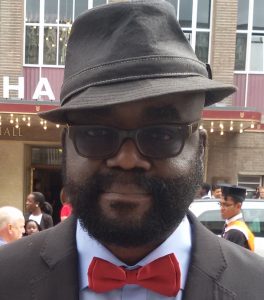
wole.olaoye@gmail.com
“They say the past always catches up with you, sooner or later. I prefer sooner, because by the time later rolls around, the past has picked up a lot of speed”, says writer Dan Thompson. For Nigeria’s minister of Communications and Digital Economy, Dr. Sheik Isa Ali Pantami, the speed with which his past has caught up with him is quite remarkable.
Now, he must be wishing he had caught up with his past before it caught up with him.
I have nothing personal against Pantami. I have no reason to hate him. I have Muslim clerics as friends and family. But this is the first time that a man with verifiable evidence of religious extremism is occupying a ministerial seat. That is what the debate has been about. Not the spin accusing political enemies, or enemies of Islam, or anything connected with the ongoing National Identity Number registration.
Anyone who has a problem with logic should not insult long-suffering Nigerians with accusations that anyone who speaks against Pantami’s fundamentalist bent is an enemy of the government or a beneficiary of an imaginary war between the minister and some ICT companies. Did his enemies or opponents induce him to make the fundamentalist statements he made many years ago?
By all means, if he has enemies in other directions, let him fight them, but the current question in the public space is whether Pantami is appointable as a minister from the word go, in a multi-ethnic and multi-religious nation.
When public officers run into trouble, they roll out contracts to rent crowds disguised as public-spirited NGOs, op-ed writers and ‘analysts’. The same childish tricks. The same unthinking, knee-jerk resort to the swamp to fling mud. The same unimaginative innuendoes and insults. In this digital age — and considering that Pantami is a ‘digital’ minister, you would have thought they would show more class!
Pantami has a history of violent Islamic rhetoric, intolerance, name-calling and instigation of worshippers. When his past started peeping out of its digital grave, the minister first denied and followed up with threats of litigation against some electronic media outlets. What started as a trickle soon became a deluge. There wasn’t just one allegation but several video and audio tapes of Pantami tacitly endorsing Al Qaeda and the Taliban, and celebrating the death of non-muslims who he called ‘infidels’.
“What is objectionable, what is dangerous about extremists is not that they are extreme, but that they are intolerant”, said Robert F Kennedy.; “The evil is not what they say about their cause, but what they say about their opponents.”
In one of his preachments, Pantami said: “We are all happy whenever unbelievers are being killed. But the Sharia does not allow us to kill them without a reason. Our zeal (hamasa) should not take precedence over our obedience to the sacred law,” he added.
His incendiary comments were contained in three audio recordings of his teachings in the 2000s, when he took extreme positions in support of the brutal exploits of Al Qaeda and Taliban elements. Pantami spoke adoringly of Osama Bin Laden, the late Al Qaeda leader: “I still consider him as a better Muslim than myself.”
Right from his days as imam of the mosque in Abubakar Tafawa Balewa University, Bauchi, (when a Part 4 student was reportedly kidnapped from his room and, according to his father, taken to the mosque where he was strangled for distributing Christian literature considered offensive to Islam), controversy has always dogged the steps of Pantami. He routinely called adherents of other faiths, infidels or kafirs. He even once spoke against the killing of Boko Haram fighters, saying military action against terrorists was a ploy to reduce the population of Muslims.
The best piece of advice ever given to the minister since the revelations broke, was the one by his friend, columnist Farooq Kperogi, who counselled him to come clean instead of playing the ostrich. Kperogi advised him to apologise and plead that he is now a changed man. And that was exactly what Pantami did when confronted with irrefutable revelations via several online platforms.
“Some of the comments I made some years ago that are generating controversies now were based on my understanding of religious issues at the time, and I have changed several positions taken in the past based on new evidence and maturity”, he explained. “I was young when I made some of the comments; I was in university, some of the comments were made when I was a teenager.
“I started preaching when I was 13, many scholars and individuals did not understand some of the international events and therefore took some positions based on their understanding, some have come to change their positions later.”
David Hundeyin, in a widely circulated opinion piece tore Pantami’s defence to shreds:
“Pantami relies on the credulity and lack of research of his audience to get away with his everlasting chameleon act of constant reinvention without accountability. Pantami is clearly expecting his audience to take to heart the emotionally believable tale of a ‘teenager’ or ’13 year-old’ being ‘immature’ and misled. In fact, ‘Suwaye Yan Taliban’ was delivered in 2006 when Pantami was 33 — 14 years older than the oldest possible teenager. Understanding this type of dishonesty is central to unraveling the Isa Pantami myth and lifting the layers of carefully constructed falsehoods and misdirection that one of Nigeria’s most dangerous individuals uses to conceal himself.”
One commentator weighed in: “Once a warrior always a warrior….Pantami sits in Cabinet meetings where the next line of actions against Boko Haram are taken….No wonder Boko Haram are always ahead of our gallant service men and women….Enemies within are more dangerous than enemies without . Pantami is a terrorist sympathiser!”
I belong to the school of thought that accords every mortal a second chance. I also firmly believe that there is a difference between one’s private space and public office. Whereas a man may be a bigot, rabble rouser, hate vendor or religious fundamentalist in his private space, such characteristics are not acceptable in public office. That is why, in a civilised democracy, when the private misdemeanours of a public official become public knowledge, the said official quickly apologises and resigns so as not to taint the high office he occupies.
Decency demands that, for the image of the country and that of the government, he should hand in his resignation without any fuss.
The clamour for the removal of Pantami from office has nothing to do with his scorecard as a minister. It is therefore sterile to flaunt whatever ‘achievements’ have been recorded under his stewardship. Also, it is not about his religion, his political party or his ethnicity. There are excellent Muslims and Christians from the North and South serving in various capacities without any controversies hanging over their necks. If Pantami had been a Christian from the southern states with fundamentalist baggage, the same rule will apply.
The point being made by Nigerians is that, given his ideological position and fundamentalist bent, the man is unfit for public office. How was he cleared during screening in the first place? Which of the security agencies cleared him?
Now, the national ID card scheme is tainted. Many people are openly questioning the propriety of entrusting the national database to a man carrying such baggage in this age of terrorism. Conspiracy theorists, too, have gone overboard with incredible scenarios. One would have thought that there are enough challenges facing the federal administration without this additional blight on its credibility.
The Pantami saga reminds me of the lengthy poem by Samuel Taylor Coleridge, “The Rime of the Ancient Mariner”. It tells the story of a mariner who killed an albatross following his ship on the high seas, thereby bringing down a curse that activates death and grief. His punishment? The crew hang the dead bird on his neck.
The exposé about Isa Alli Pantami’s fundamentalist posture is his own albatross which will hang around his neck (and the necks of all his sympathisers) for as long as he remains in public office.
- Wole Olaoye is a public relations practitioner and a public affairs commentator and can be reached at wole.olaoye@gmail.com


